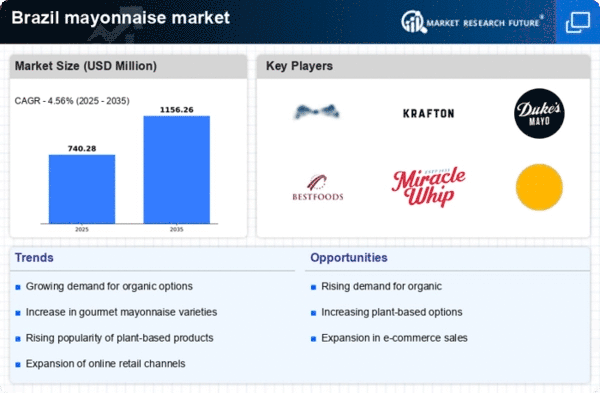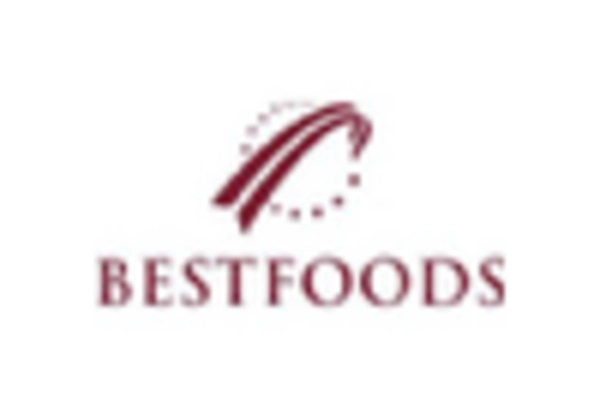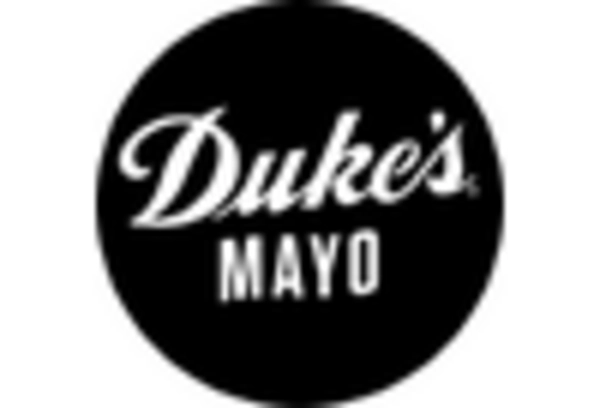Innovations in Flavor Profiles
Innovation plays a crucial role in the mayonnaise market in Brazil, as manufacturers increasingly experiment with diverse flavor profiles to cater to evolving consumer preferences. Traditional mayonnaise is being complemented by variants infused with herbs, spices, and even exotic ingredients, appealing to a broader audience. This trend is particularly evident in the gourmet segment, where unique flavors such as chipotle, garlic, and truffle are gaining traction. In 2025, flavored mayonnaise products are expected to represent around 15% of total mayonnaise sales in Brazil, showcasing the potential for growth in this niche. The introduction of these innovative products not only attracts adventurous consumers but also encourages brand loyalty, as customers seek to explore new culinary experiences. Consequently, the mayonnaise market is likely to see increased competition as brands strive to differentiate themselves through unique offerings.
Rising Demand for Convenience Foods
The mayonnaise market in Brazil experiences a notable surge in demand for convenience foods. As urbanization continues to rise, consumers increasingly seek quick meal solutions that require minimal preparation. This trend is reflected in the growing popularity of ready-to-eat meals and snacks that incorporate mayonnaise as a key ingredient. In 2025, the convenience food sector is projected to account for approximately 30% of the overall food market in Brazil, indicating a significant opportunity for mayonnaise producers. The mayonnaise market benefits from this shift, as it is often used in sandwiches, salads, and dips, making it an essential component of many convenient meal options. Furthermore, the fast-paced lifestyle of Brazilian consumers drives the need for products that enhance flavor without requiring extensive cooking, thereby bolstering the mayonnaise market's growth.
Expansion of Retail Distribution Channels
The mayonnaise market in Brazil benefits from the expansion of retail distribution channels, which enhances product accessibility for consumers. Supermarkets, hypermarkets, and convenience stores are increasingly stocking a variety of mayonnaise brands and flavors, making it easier for consumers to find their preferred products. In 2025, it is estimated that retail sales of mayonnaise will account for approximately 70% of total market revenue in Brazil, underscoring the importance of effective distribution strategies. Additionally, the rise of online grocery shopping is further diversifying the purchasing options available to consumers. This trend not only increases the visibility of mayonnaise products but also allows brands to reach a broader audience. Consequently, the mayonnaise market is poised for growth as retailers adapt to changing consumer shopping habits and preferences.
Influence of Culinary Trends and Social Media
The mayonnaise market in Brazil is significantly influenced by culinary trends and the pervasive impact of social media. As food-related content proliferates on platforms such as Instagram and TikTok, consumers are increasingly exposed to innovative recipes and creative uses for mayonnaise. This exposure encourages experimentation and drives demand for mayonnaise as a versatile ingredient in various dishes. In 2025, it is anticipated that social media-driven culinary trends will contribute to a 20% increase in mayonnaise consumption among younger demographics. The ability to showcase visually appealing dishes featuring mayonnaise on social media platforms not only enhances brand visibility but also fosters a sense of community among food enthusiasts. As a result, the mayonnaise market is likely to thrive as consumers seek to replicate trending recipes and share their culinary experiences.
Growing Popularity of Plant-Based Alternatives
The mayonnaise market in Brazil is witnessing a significant shift towards plant-based alternatives, driven by the increasing number of consumers adopting vegetarian and vegan diets. This trend reflects a broader global movement towards healthier and more sustainable food choices. In 2025, plant-based mayonnaise is projected to capture approximately 10% of the total mayonnaise market in Brazil, indicating a growing acceptance of these alternatives. The rise of health-conscious consumers, coupled with concerns over animal welfare and environmental sustainability, has prompted manufacturers to develop innovative plant-based formulations that mimic the taste and texture of traditional mayonnaise. As a result, the mayonnaise market is likely to expand, catering to a diverse range of dietary preferences and enhancing its appeal to a wider audience.
















